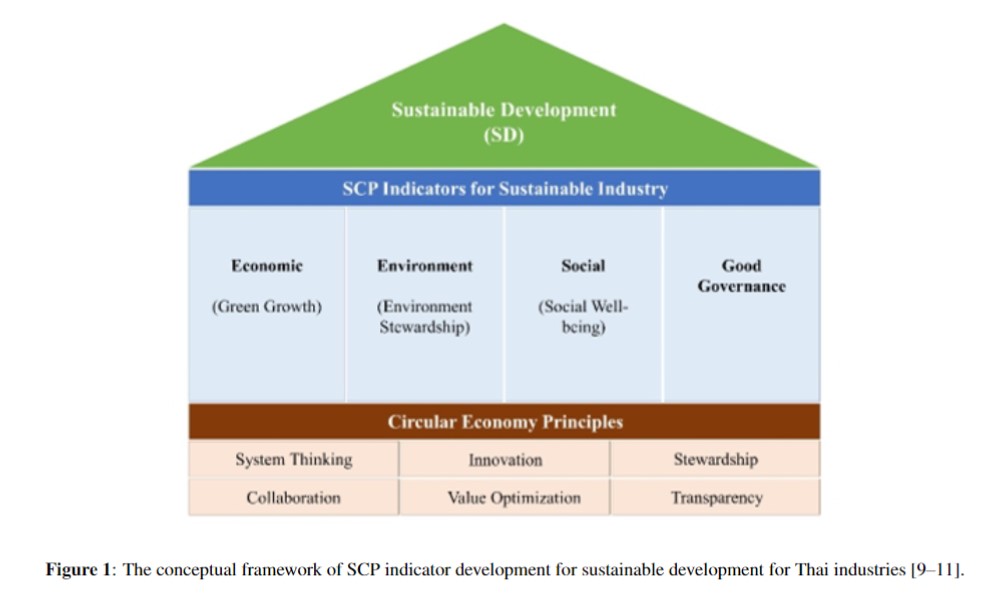Development of sustainable consumption and production indicators for industrial sector according to circular economy principles in Thailand
Main Article Content
Abstract
This research aimed to: (1) investigate the sustainable consumption and production indicators for industriesas well as difficulties and limitations in using the indicators for the Eco-Factory program under the Federation of Thai Industries; and (2) develop the sustainable consumption and production indicators for Thai industries based on the Sustainable Consumption and Production Roadmap 2017–2037 and circular economy principles which are part of Thailand’s long–term strategic plan of the national industrial development goals based on the BCG Model (Bio–Circular–Green Economy Model). At present, there is none of academic study on the Sustainable Consumption and Production (SCP) indicators for sustainable development at the
micro level for industry in Thailand. This research focused on stakeholder involvement in developing indicators through surveys, an in–depth interview, a focus group meeting, a seminar, and a workshop. The study achieved the final version of SCP indicators (26 sets of indicators, 60 sub–indicators) consisting of 4 dimensions including environmental, social, economic, and good governance dimensions. Recommendations for implementation of indicators are (1) initiating a pilot project to support practical implementation in the industrial sectors based on industrial types including upstream, midstream, and downstream industries;(2) conducting a periodic review of the indicators, such as every 3 years by entrepreneurs and other sectors, and there should be standards, evaluation, and certification based on the circular economy standards of Thai Industrial Standard Institute
(TISI); and (3) supporting the information provision and workshop at the first step to promote the readiness for the industries interested in the implementation, as well as supporting the sustainability reporting of indicator implementation, and creating a network of collaboration between industries.
Article Details

This work is licensed under a Creative Commons Attribution-NonCommercial-NoDerivatives 4.0 International License.
References
Office of the National Economic and Social Development Board (2016). Summary the Eleventh National Economic and Social Development Plan (2012–2016). Bangkok: National Economic and Social Development Board.
Office of the National Economic and Social Development Board (2017). Summary The Twelfth National Economic and Social Development Plan (2017–2021). Bangkok: Office of the National Economic and Social Development Board.
National Science and Technology Development Agency (n.d.). BCG Economy Model. https://www.nstda.or.th/th/nstdastrategy-plan/nstda2/12785-bcg-economy.
Office of Natural Resource and Environmental Policy and Planning (ONEP) (2017). Sustainable Consumption and Production Roadmap 2017–2036 (SCP Roadmap 2017–2036): Office of Natural Resource and Environmental Policy and Planning (ONEP).
Office of Natural Resource and Environmental Policy and Planning (ONEP) (2020). Sustainable Consupmtion and Production Roadmap 2017–2037 (Revised Version 1). Thammasat University Research and Consultancy Institute: Office of Natural Resource and Environmental Policy and Planning (ONEP).
Federation of Thai Industries and Industrial Estate Authority of Thailand (2018). Manual of Eco Factory Requirements.
T. Waas, J. Huge, T. Block, T. Wright, F. Benitez–Capi stros, A. ´ Verbruggen, Sustainability Assessment and Indicators: Tools in a Decision–Making Strategy for Sustainable Development. Sustainability 6 (2014) 5512–5534. doi:10.3390/su6095512.
Thailand Textile Institute. Thai Textile Statistics 2018/2019. Bangkok: Thailand Textile Institute, 2019.
C. Joung, J. Carrell, P. Sarkar, S. Feng, Categorization of Indicators for Sustainable Manufacturing. Ecological Indicators 24 (2013) 148–157. doi:10.1016/j.ecolind.2012.05.030
British Standards Institution. Framework for Implementing the Principles of the Circular Economy in Organizations–Guide. BSI Standards Publication: BSI Standards Limited, 2017.
N. Scialabba, SAFA Guidelines. Sustainability Assessment of Food And Agriculture Systems. Version 3.0, 2013.
A. Feil, D. Schreiber, C. Haetinger, V. Strasburg, C. Barkert, Sustainability Indicators for Industrial Organizations: Systematic Review of Literature. Sustainability 11 (2019) 854. doi:10.3390/su11030854.
M. Winroth, P. Almstrom, C. Andersson, Sustainable Indica-tors at Factory Level–A Framework for Practical Assessment, 2012.
G. Eseoglu, O. Vayvay, Z. Kalender, Assessment of Sustain- ¨ability Performance Indicators in Manufacturing, 2014.
Global Reporting Initiative. G4 Sustainability Reporting Guidelines: Reporting Principles and Standard Disclosures: Reporting Principles and Standard Disclossures, 2015.
I. Garbie, Sustainable Development Index on Macro–Level in Industrial Estates and Specialised Sectors. International Journal of Industrial and Systems Engineering 24 (2016) 384.doi:10.1504/IJISE.2016.10000247.


